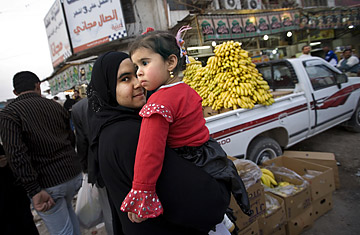
Men, women and children stroll the streets of central Basra in Iraq on Feb. 10, 2009
While governments from Tokyo to London are sounding alarms as the global financial crisis looks to deepen over the rest of 2009, U.S. and Iraqi policymakers in Baghdad believe they have bought a year's time before the downturn poses a threat here. "The economy this year is going to be O.K.," says a U.S. official who focuses on economic issues in Iraq. "The problem is next year."
Iraq's ability to weather the global slowdown at the moment rests in the huge currency reserves it earned in recent years selling oil as prices soared. Iraq has roughly $30 billion in surpluses from previous years. That has allowed the country to maintain minimum standards of services and governance despite depression-scale unemployment (no reliable data are available, but some experts estimate unemployment may be over 20%). Iraq's GDP is growing steadily despite the global financial crisis. Last year, GDP grew in Iraq an estimated 7% to 9%. This year, GDP is projected to rise 5% to 7%. (See pictures of life returning to Iraq's streets.)
Virtually all of Iraq's income comes from oil production, and through its state-run oil company, the country has been working assiduously for more than a year to increase its output. But the government's dilapidated oil facilities have essentially maxed out their production capacity; U.S. and Iraqi officials say any significant rise in production would require massive involvement by foreign firms, which continue to haggle with the government of Iraq over business terms, with little sign of progress toward possible deals.
The recent drop in oil prices poses the most immediate threat to the government budget in Iraq, where public-sector spending fuels almost the entire economy. With oil prices lower, Iraq expects to run a deficit this year of roughly $20 billion, which could be covered by the nation's existing cash reserves. Once that money is gone, however, Iraq will be in the same position as many countries facing a cash crisis around the world at the moment — but with added problems unique to a country rich with oil but troubled by the legacies of wars.
In lieu of further oil revenue, Iraq will have to raise cash elsewhere to maintain roughly the existing level of government spending, which U.S. and Iraqi officials feel is necessary to keep the economy steady. Despite surpluses and positive economic signs, Iraq cannot currently generate cash on capital markets like other countries by the sale of bonds because of hundreds of unsettled claims worth billions of dollars related to Iraq's 1991 invasion of Kuwait. Scores of possible lawsuits by Kuwaitis and Westerners lurk in countries where Iraq might sell bonds, which could be seized by courts deciding cases put forward by plaintiffs allegedly wronged by the former regime.
Why haven't plaintiffs attached Iraq's oil revenues in international courts? That account is kept safe by special U.N. protections at the moment, and its currency reserves in Baghdad cannot be touched. But any move by Iraq on international capital markets involves a gamble unlikely to turn out well unless Iraq takes steps to settle the outstanding claims, an issue U.S. officials in Baghdad are stressing when talking to Iraqi policymakers in trying to shore up the nation's finances for 2010 and beyond.
